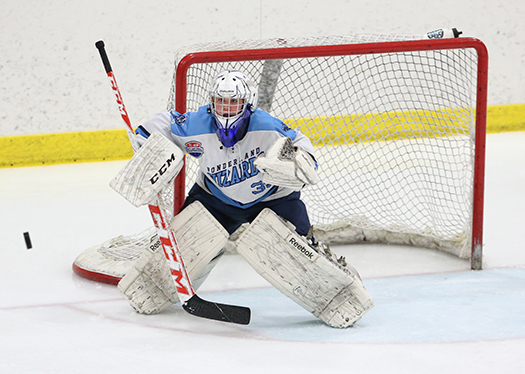5 ways to improve your goaltending
A goaltender in hockey is the single most important position in all of team sports. Still, many coaches are uncomfortable working with their goalies. We have all been to clinics and listened to great discussions regarding the technical aspects of goaltending.
Hopefully this discussion will give you some concrete practical applications to improve the skills of goaltenders of all ages and skill levels.
Five topics to improve goaltending skills:
- Skating
- Positioning
- Make practices "goalie friendly"
- Help your goalie evaluate his game performance
- Develop a work ethic
1. Skating
Skating is the key. Goalies must be able to move in all directions, as quickly as possible, to react/recover and make an abrupt, balanced transition from one move to another, while staying in their stance, ready to make a save.
Coaches need to help their goaltenders with their skating every day. That can be done through skating drills, or through exercises that improve movement around the crease.
A goalie must be able to move well while maintaining a good “ready position,” minimizing any holes for a shooter to aim at.
Concentrate on quality repetitions to create proper muscle memory.
2. Positioning
When I am on my game, I only need to move an inch in either direction to make a save. If you see me making a spectacular save, I am struggling with my game.
A sliding two-pad save or lunging glove save may look flashier than a shot that is drilled into a goaltender’s midsection, but it’s likely caused by poor positioning.
A well-positioned goalie has a better chance of being hit by a shot. You want your goalie to be centered, square and out on an angle.
You must be constantly aware of your goalie’s positioning during games and practices, and create drills that work on staying square to the shooter.

You want your goaltender to be centered, square and out on an angle to give himself or herself the best opportunity to make a difficult save look easy.
3. Make Practice "Goalie Friendly"
Skill, as it pertains to basketball, is the knowledge and the ability to quickly and properly execute the fundamentals. Being able to do them is not enough. They must be done quickly. And being able to do them quickly isn’t enough, either. They must be done quickly and precisely at the right time. You must learn in practice to react properly, almost instinctively.
A proper warm up is important. Start games and practices with drills that help a goaltender get loose and gain confidence. Remember, warm up drills are meant to warm up the goaltender, not to practice goal scoring. Tell your skaters to get their shots on net.
Make shooting drills as game-like as possible by providing traffic in front of the goalie and creating opportunities for rebrounds and scrums in front of net.
4. Help Your Goalie Evaluate Performance
Experience is a cruel teacher because it gives you the test first and the lesson afterward.
Goals scored against a goaltender often offer great lessons. Take advantage of them by talking with goaltenders about what they did right and wrong on the play. A goaltender may have executed all the right moves, put himself or herself in the proper position to make the save and then forgot to close the five-hole. It’s important to stress the positives as well as point out the negatives.
Encourage an honest dialogue to get your goalie thinking about and questioning his thought process.
Analyze situations that arose in the game. What did the goalie see? What if anything might he or she have done differently?
Develop measurable standards or goals for each game to see where progress is made and what are the greatest areas that need improvement.
5. Develop a Work Ethic
How does a goalie go about gaining confidence? There is only one way, and that is from working hard, hard enough to realize you are giving maximum effort and can’t be expected to give more. If you cheat on yourself, if you are giving less than your best, you know it. And with this knowledge, it is very difficult to feel confident. There are no short cuts. No magic.
Goaltenders’ work ethic is often overlooked. Many times coaches allow their goalies to be lazy. It’s your responsibility to demand consistency in terms of effort. Your goalie must be the team leader in setting the work standards for the team. By competing hard for every shot, your goalie challenges his or her teammates to be better every day, and also improves his or her own skills.
 Canada (
Canada (



